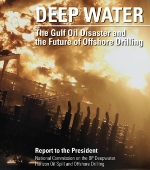
Oil Spill Commission Justice
Perhaps the least publicized, but critical, conclusion in the final report by the National Commission on the BP Deepwater Horizon Oil Spill and Offshore Drilling had nothing to do with drilling safety. It’s a recommendation that is essential to ensuring that the Gulf Coast recovers from the disaster: “Congress should dedicate 80 percent of the Clean Water Act penalties to long-term restoration of the Gulf of Mexico.”

The commission’s recommendation echoes a recent government report (pdf) by Navy Secretary and former Mississippi Gov. Ray Mabus. The report details the need for a long-term environmental restoration plan for the Gulf Coast to fulfill President Obama’s “commitment to the Gulf Coast that goes beyond responding to the crisis of the moment…[including] multiple economic disasters and decades of environmental degradation that has led to disappearing wetlands and habitats.”
For most Americans, the BP spill was one of the most significant events of 2010. Oil-soaked wetlands and birds highlighted a fragile natural landscape already suffering from more than a century of industrial damage. Our hearts went out to impacted coastal communities, dependent on fishing and tourism, and the many people still working to recover from devastating hurricanes earlier in the decade.
While Americans did what they could to help individually, Congress failed to pass into law a single response to this national catastrophic tragedy. Even the simple principle that any federal windfall from the disaster should be reinvested in the impacted environment – an idea that transcends politics and party – was left on the table. Senators and representatives from both parties introduced bills, but even in the frenzied productivity of the “lame duck” session, an affirmative response to the Deepwater Horizon disaster went nowhere.
Now, two weeks into the new 112th Congress, it is time for Congress to send the President a bill dedicating the penalties to restoration. U.S. Rep. Steve Scalise (R-La.) and several cosponsors already have introduced legislation that would accomplish this goal, and senators are expected to do the same soon. Both parties should move quickly to pass such legislation.
Based on the estimated spill size of nearly 5 million barrels, the CWA penalties will range from $5 billion and $21 billion, depending on whether the responsible parties are found to have been grossly negligent for the Macondo well blowout. However, absent congressional action, CWA fines automatically will be deposited in the federal treasury and disappear into the general budget.
It would be wrong for the federal government to make a windfall from the BP disaster. Instead, Congress should invest a significant portion of the CWA penalties in the aggressive and comprehensive restoration of the ecosystem, creating thousands of new jobs and providing benefits to the commercial fishing and tourism industries – among others – impacted by the ecosystem damage.
Posted by Paul Harrison on Jan 19, 2011